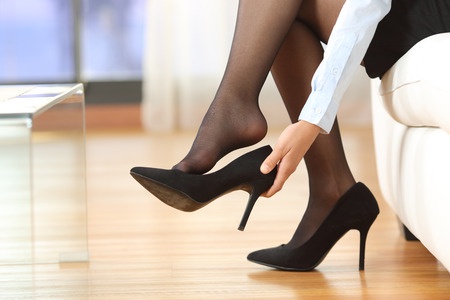More needs to be done to stop women having to wear high heels against their will, according to the most thorough review of scientific studies into the shoes.
The review by researchers at the University of Aberdeen examined research into the physical damage wearing high heels can cause as well as the social and cultural aspects surrounding their wear.
Unsurprisingly, a wealth of studies demonstrated wearing high heels increases the risk of developing musculoskeletal conditions from the spine to the toes and also increases the chance of injury.
In the first review of its type, the study also showed that wearing high heels increases women’s attractiveness to men and can reward female wearers with other benefits in terms of male attention and their own view of their beauty, so high heel wear clearly has social benefits as well as health drawbacks.
The study, published today (Tuesday August 1) in BMC Public Health journal mentions a recent policy controversy regarding whether or not employers are legally allowed to stipulate that female staff wear high heels at work. The authors draw a distinction between the UK, where the government has pledged to develop guidelines and raise awareness that female workers should not be forced to wear high heels without introducing new legislation, and the Canadian province of British Columbia which has amended legislation to specifically prohibit employers from requiring staff to wear high heels.
The review found large amounts of studies showed a link between wearing high heels and an increased risk of bunions, musculoskeletal pain and personal injury. However, it found a lack of clear evidence of an association between high heel wear and osteoarthritis – something that has been taken as a matter of fact by some.
Dr Max Barnish, who led the research at the University of Aberdeen, said: “From our review it is clear that despite the huge amount of evidence showing heels are bad for individuals’ health, there are complex social and cultural reasons that make high heel wearing attractive.”
Dr Heather Morgan, a lecturer at the University of Aberdeen, added: “Of course we are not trying to tell anyone that they should or shouldn’t wear high heels but we hope this review will inform wearers to help them weigh up the health risks with social benefits, as well as putting pressure on law makers to toughen up legislation so that no one is forced against their will to wear them in the workplace or in licensed public social venues. However, expectations are not always explicit and some may feel forced even if the law protects them.”
Dr Barnish added: “We feel the UK government should follow the lead of other authorities who have introduced specific laws to tackle this practice rather than simply relying on existing legislation which has left the situation in this country uncertain and open to misinterpretation. Also, this matter has in the UK been so far addressed through UK-wide equality laws. However, there may be scope for the devolved nations of the UK such as Scotland to consider introducing further measures under devolved health legislative powers.”
The researchers recommend further research into the links between high heels and osteoarthritis, the influences on women’s freedom of choice in shoe selection, heteronormativity and social consequences, and a monitoring over time of how issues of enforced high heel wear are addressed.
They also suggest more research is done into the issue of second party injury (high heels injuring people other than the wearer), as work in this area has shown stiletto high heels can cause serious injury to others but not how common such injuries are.


